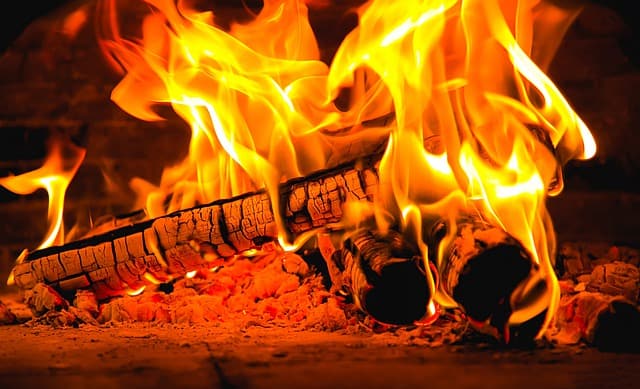For those of us who live in the northern hemisphere, the coldest winter months tend to be January and February. The home tends to be the driest in winter which is why those of us with forced air heating and other methods tend to use a humidifier of some kind to moisten the air. The question is why does this happen?
Does a fireplace dehumidify and dry the air or is it due to something else? It begs the question as to why the air feels so dry during the coldest months of the air and why we also tend to get sore throats and dry skin, too. I decided to take a closer look and clear this up.
Your choice of heating won’t dry the air in your home as much as warm humid air leaking out of your home and dry cold air entering from outside the house. Dry air from outside the home enters from open doors and windows and from air leaks that bring cold air inside the house.
The more leaks and gaps you have in your home from doors, windows, air ducts, the basement and your roof structure, the more dry air you will draw into your home.

The myth of dry heat and your choice of heating
The infiltration rate is used to describe the flow of outside air into a building. The exfiltration rate refers to the rate of air leaving the home and going outside. In winter, the cold air outside the home is dryer and less humid than the air inside the home.
So when cold air is allowed to enter the home through various means, the net effect is often that the air inside the home gets dryer as the more humid warm air escapes. People tend to blame this on the heat and refer to it as a dry heat accordingly.
When it comes to a fireplace, wood stove, pellet stove or other wood-burning heating source, the concentrated heat in front of it tends to give people the feeling that the heat is dry because of the radiant heat that is produced. Whereas forced air sends warm air throughout the home a fireplace gives the effect of concentrated warmth coming right from the source.
The bottom line is that if you have a leaky home that allows cold air to enter, your inside air will be dry regardless of the type of heating you use.
Where you live affects the humidity inside your home
Your local climate and level of humidity matters. The drier and colder the air outside your home especially in winter, the drier your air may get inside the home if your home has air leaks which it most likely does.
The 10 least humid states in the U.S. are Nevada, Arizona, New Mexico, Utah, Colorado, Wyoming, Montana, California, Idaho and Oklahoma.
In Canada, the province of Alberta and the city of Calgary in particular is very dry.
No matter how airtight and sealed even new homes, you are very dependent on your local climate and level of humidity. While the inside of your home can certainly vary, it is still very dependent on the humidity levels outside your home at the time.
Plus when you crack a window or open a door, cold dry air is allowed to enter the home.
How to humidify a home during cold winter months
- If you have a wood stove, put a cast iron pot filled with water on top of the stove to help add humidity to the air as the water heats.
- Use a humidifier either attached to the furnace if you have one or a portable unit that can be moved around the house or near the wood stove or fireplace.
- If you haven’t yet installed your fireplace, installing it in a lower floor or on the lowest floor will allow the warm air to naturally rise in the home so that the warmth is better spread out which can help humidity levels.
- You can also purchase small cold mist humidifiers that plug into a USB outlet on your computer to humidify a specific bedroom or office space.
- Check for air leaks in the home particularly around doors and windows and seal them. Pay attention to attic and roof structure leaks too.
- Keep windows closed during the winter. Letting cold dry air into the home dries out the air inside the home.
- When you shower, keep the bathroom door open to allow the steam to circulate as it will help to keep humidity higher.
While drinking fluids and moisturizing won’t help the humidity in your home, it’ll help you stay hydrated and keep your skin soft. Dry mouth and skin are common when the air is dry and humidity is low.


